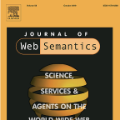CCF推荐 | 高引SCI期刊专刊信息4条
数据库管理与信息检索
Journal of Web Semantics
Special Issue on Benchmarking Semantic Web Solutions
摘要截稿: 2019-07-31
全文截稿: 2019-08-31
影响因子: 1.348
CCF分类: B类
中科院JCR分区:
• 大类 : 工程技术 - 4区
• 小类 : 计算机:人工智能 - 4区
• 小类 : 计算机:信息系统 - 4区
• 小类 : 计算机:软件工程 - 3区
网址: http://www.journals.elsevier.com/journal-of-web-semantics
The availability of benchmarks is often regarded as a prerequisite for sustainable developments in quantitative research. From a practical perspective, the cost and effort required for introducing Semantic Web and Linked Data technology is significant. A key step towards abolishing the barriers to the adoption and deployment of this technology is to provide open benchmarking reports that allow users to assess the fitness of existing solutions for their purposes.
In this special issue, we hence welcome articles (1) proposing benchmarks and related platforms, and/or (2) performing a throughout evaluation of Semantic Web solutions. A focus of the special issue will be scalability and reproducibility. The target topics of the benchmark/evaluation include (but are not limited to):
1) Knowledge extraction
Named entity recognition
Disambiguation
Relation extraction
Open and closed knowledge extraction
2) Link discovery and prediction
Linking at scale
Linking for dedicated data types (e.g., geospatial data)
3) Knowledge curation and fact checking 4) Ontology alignment
Alignment discovery
Alignment repair
Complex ontology alignment
5) Tabular data to knowledge graph matching
Cell to KG entity matching
Column to KG semantic type
Relation discovery among table columns
KG population
6) OWL reasoning
Classification
Entailment checking
Class satisfiability
Ontology satisfiability
Query answering
7) Knowledge graph completion
Semantic embeddings
Quality of embeddings
8) Ontology Based Data Access
Performance
Relational schema to ontology alignment
9) Visualization
10) Browsing
计算机科学与技术
Microprocessors and Microsystems
Special Issue on Omni-layer Intelligent systems (COINS) 2019
全文截稿: 2019-09-01
影响因子: 1.049
CCF分类: C类
中科院JCR分区:
• 大类 : 工程技术 - 4区
• 小类 : 计算机:硬件 - 4区
• 小类 : 计算机:理论方法 - 4区
• 小类 : 工程:电子与电气 - 4区
网址: https://www.journals.elsevier.com/microprocessors-and-microsystems
The Intelligent Internet of Things (IoT) tsunami is affecting every aspect of our daily lives, ranging from smart cars, homes, cities and factories to smart health and environments. To enable this transformation and to better understand the untapped opportunities, the interdisciplinary landscape of IoT demands a large number of significant technological advancements in the hardware and software communities to come together and to synergize their efforts.
This Special Issue will be devoted to the selected high-quality papers of International Conference on Omni-layer Intelligent systems (COINS) 2019. The focus of this SI is on novel omni-layer techniques for smart IoT systems. In particular, we would like to address all-important aspects of novel IoT technologies from Connected Devices, to Edge/Fog, Cloud, and application, covering manufacturing, materials, CMOS and beyond-CMOS devices, architecture, embedded systems, reconfigurable hardware, network, cloud, Omni-layer artificial intelligence and machine learning, big data, emerging applications, as well as human-machine interaction, achieving the goal of accuracy, privacy, reliability and security.
Please submit your extended paper, as soon as possible, but no later than September 1, 2019. All manuscripts and any supplementary material should be submitted to the COINS 2019 Special Issue (NOT to any regular or other special issue) via the Elsevier online system of the journal, available athttps://www.evise.com/profile/api/navigate/MICPRO.
Each manuscript should include the complete paper text, all illustrations, and references. Please see the submission instructions on the web site. Please also note that the extended papers must contain at least 30% of new material different from the original work published in COINS conference, should have a tutorial value and include clear explanations made when using a high-quality graphical material (figures, graphs, etc.).
信息安全及密码学
Computer Law & Security Review
Call for paper Convention 108 and the future data protection global standard
摘要截稿: 2019-08-09
全文截稿: 2019-09-18
影响因子: 0.0
CCF分类: C类
网址: http://www.journals.elsevier.com/computer-law-and-security-review/
On November 2019, Computer Law & Security Review in collaboration with Politecnico di Torino and with the support of the Council of Europe, Consultative Committee of the Convention for the Protection of Individuals with Regard to Automatic Processing of Personal Data (Convention 108), will hold an international academic workshop on “Convention 108 and the future data protection global standard”. This workshop aims to stimulate the debate on the role of Convention 108 in the current and future global scenario of data protection regulation.
The proceedings of this workshop will be published in a special issue of this Review. The purpose of this call is to select three best papers to be presented by the authors during the workshop. These papers and all the accepted papers will be included in the special issue.
If GDPR has been described as the new golden standard for data protection, Convention 108 may represent the potential global standard in this field. After years when the Convention on data protection adopted by the Council of Europe has been mainly considered as the archetype of the European national laws and the EU Directive, the recent progressive expansion of this model and the modernised version of the Convention have revitalised its role in the global scenario.
In a multipolar world characterised by different regulatory approaches and by data protection laws that in many countries are still absent or in their early stages, Convention 108 may represent the embodiment of the Latin saying “in medio stat virtus”. Between the extremes of a weak safeguard of individual rights and a golden standard, Convention 108 provides a solution that can strike the right balance in many local contexts which cannot yet match the level of the golden standard.
Moreover, Convention 108 adopts a principles-based approach, which is a cornerstone for a broader set of sector-specific regulatory initiatives in the field of data protection. This sector-specific approach, based on a combination of hard and soft law instruments, provides a more flexible framework to address the challenges that characterise societies which are continuously evolving under the pressure of technology development.
Against this scenario, this call for papers aims to invite experts from different fields and geographical areas to have a discussion centred on three main tracks:
1. The regulatory competition for a global standard in data protection
In recent years, the large majority of countries in the world have adopted data protection laws. This process is not only the result of initiatives at national level, but it is also the consequence of regional strategies on data processing. In this regard, the European models (Convention 108 and GDPR) are the most influential reglementary frameworks, but other geographical areas have developed or aim to adopt their own standards. This is the case of the US, but also of the initiatives adopted by APEC, OECD and, with a minor geographical impact, by the African Union and the Economic Community of West African States. Moreover, several countries (e.g. China) have developed autonomous political and regulatory approaches to data use.
In an interconnected world characterised by continuous global data flows, these differences in data protection are significant and politically sensitive. For this reason, there is an increasing competition for a global standard in this field. The papers of this track address this topic discussing the legal and political issues concerning this competition and focusing on the role that Convention 108 can play in this scenario.
2. Convention 108 and its sector-specific applications
The general principles-based text of Convention 108 has been interpreted and tailored to a series of sector-specific situations and types of processing throughput the years. This targeted guidance has been provided by the committee of Convention 108, giving life to the key principles of data protection in a variety of cases and in light of emerging challenges.
Within this framework, for example, the latest Guidelines adopted by the Committee provide orientations for the respect of the right to data protection in AI related processing. The Committee of Convention 108 had also been working on the drafting of instruments adopted by the Committee of Ministers of the Council of Europe, the latest one being Recommendation (2019)2 on the protection of health-related data. In 2015, a recommendation on data protection in an employment context was adopted by the committee of Ministers and another crucially important Recommendation adopted in 2010 tackles the risks of profiling.
The papers of this track will discuss one or more sector-specific applications of Convention 108 or, from a broader perspective, will address the issues concerning the principles-based model of the Convention and its application in different fields.
3. The experience of the countries that have recently adopted and implemented Convention 108
Convention 108 has been adopted by 54 countries around the world. This process has been characterised by a progressive geographical territorial expansion of the Convention from the original European area to a broader context, including countries from Asia, Africa and South America.
The papers of this track focus both on the reasons of this trend and on country-specific issues concerning the adoption of Convention 108. The main aim of this track is analysing challenges, impacts and potential constraints which characterise the adoption of Convention 108 around the world or in one or more countries.
图形学与多媒体
Computer Aided Geometric Design
Call for Papers: From Theoretical to Applied Geometry: Recent Developments
全文截稿: 2019-10-31
影响因子: 1.522
CCF分类: B类
中科院JCR分区:
• 大类 : 工程技术 - 4区
• 小类 : 计算机:软件工程 - 3区
• 小类 : 应用数学 - 3区
网址: http://www.journals.elsevier.com/computer-aided-geometric-design
This special issue focuses on recent developments in theoretical and applied geometry, originating from the interaction between classical methods in geometry with computational approaches from approximation theory and computer aided geometric design. In particular, it will contain relevant papers which were presented at the
Conference on Geometry: Theory and Applications (University of Innsbruck, Austria, June 3-7, 2019).
Additional submissions are also welcome.
Topics. Main topics include, but are not limited to:
Computer Aided Geometric Design
Computational Geometry
Computer Graphics
Differential Geometry
Geometric Computing
Geometric Modeling
Isogeometric Analysis
Robotics and Kinematics
广告
登录查看更多
相关内容
Arxiv
16+阅读 · 2020年1月2日
Arxiv
3+阅读 · 2019年1月3日




